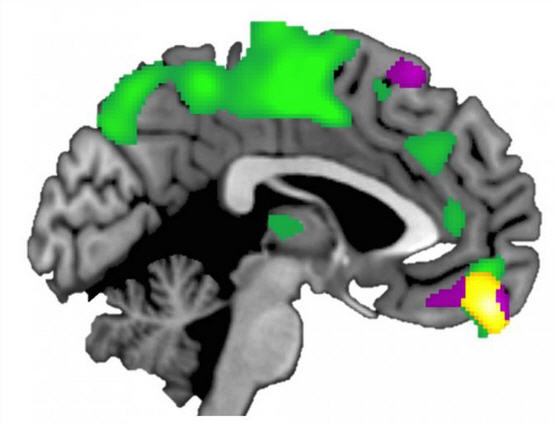Brain structure varies depending on how trusting people are of others, study shows

The ventromedial prefrontal cortex (yellow) is larger in those that tend to be more trusting of others compared to those that tend to be less trusting of others. Credit: Brian Haas/University of Georgia
The research may have implications for future treatments of psychological conditions such as autism, said the study's lead author Brian Haas, an assistant professor in the department of psychology. Each autism diagnosis is on a spectrum and varies, but some diagnosed with the condition exhibit problems trusting other people.
“There are conditions, like autism, that are characterized by deficits in being able to process the world socially, one of which is the ability to trust people,” Haas said.
“Here we have converging evidence that these brain regions are important for trust; and if we can understand how these differences relate to specific social processes, then we may be able to develop more targeted treatment techniques for people who have deficits in social cognition.”
Haas and his team of researchers used two measures to determine the trust levels of 82 study participants.
Participants filled out a self-reported questionnaire about their tendency to trust others. They also were shown pictures of faces with neutral facial expressions and asked to evaluate how trustworthy they found each person in the picture. This gave researchers a metric, on a spectrum, of how trusting each participant was of others.
Researchers then took MRI scans of the participants' brains to determine how brain structure is associated with the tendency to be more trusting of others. What researchers found, said Haas, were differences in two areas of the brain.
“The most important finding was that the grey matter volume was greater in the ventral medial prefrontal cortex, which is the brain region that serves to evaluate social rewards, in people that tended to be more trusting of others,” he said.
“Another finding that we observed was for a brain region called the amygdala. The volume of this area of the brain, which codes for emotional saliency, was greater in those that were both most trusting and least trusting of others. If something is emotionally important to us, the amygdala helps us code and remember it.”
Future studies may focus on how, and if, trust can be improved and whether the brain is malleable according to the type of communication someone has with another, he said.
###
The study was published in the journal NeuroImage. Haas' research team included undergraduate students Alexandra Ishak and Ian Anderson and graduate student Megan Filkowski.
The study on “The tendency to trust is reflected in human brain structure” is available online at http://www.
For more information on the UGA psychology department, see http://www.
Media Contact
All latest news from the category: Studies and Analyses
innovations-report maintains a wealth of in-depth studies and analyses from a variety of subject areas including business and finance, medicine and pharmacology, ecology and the environment, energy, communications and media, transportation, work, family and leisure.
Newest articles

Parallel Paths: Understanding Malaria Resistance in Chimpanzees and Humans
The closest relatives of humans adapt genetically to habitats and infections Survival of the Fittest: Genetic Adaptations Uncovered in Chimpanzees Görlitz, 10.01.2025. Chimpanzees have genetic adaptations that help them survive…

You are What You Eat—Stanford Study Links Fiber to Anti-Cancer Gene Modulation
The Fiber Gap: A Growing Concern in American Diets Fiber is well known to be an important part of a healthy diet, yet less than 10% of Americans eat the minimum recommended…

Trust Your Gut—RNA-Protein Discovery for Better Immunity
HIRI researchers uncover control mechanisms of polysaccharide utilization in Bacteroides thetaiotaomicron. Researchers at the Helmholtz Institute for RNA-based Infection Research (HIRI) and the Julius-Maximilians-Universität (JMU) in Würzburg have identified a…



